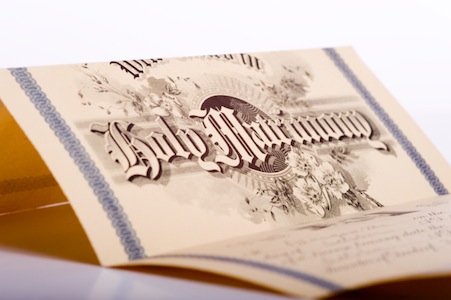This was originally posted at The Feminist Mystique as part of the Last Name Project. Republished here with permission.
Our naming story is complicated, but ultimately shallow. When we got engaged, my wife and I discussed what name we would take. Our choice of name mattered little as a signifier; we’re both Jewish and at the time enjoyed equally Jewish-sounding names. Frankly, I hadn’t given it any thought, but as a feminist, my fiance naturally had and wanted reasons beyond patriarchal tradition for my name (Aronson) to take preference to hers or to some other name we might mutually agree to. Rather than pick a “winner,” she recommended compromising on a hybridized name. However, her suggestion (Aronfalk), while logical, nonetheless struck me as ungainly—too much like Amtrak, I told her. I suggested we try “A.Falk,” with a silent “A” (bear in mind that this was in the mid-90s, more or less at the dawn of the popular Internet, and before such a naming convention had come into wider use).
While apparently whimsical on its face, my suggestion was sincere and entirely pragmatic. By adopting this eclectic homophone of her patronymic, we’d share a simple-sounding name that would appear conventional in written form (as most people would take the “A.” for a middle initial), retain whatever advantages were to be had in nearing the top of the alphabet (front-row seating for future children in school?), and have a silly anecdote with which to break the ice at cocktail parties.
She found this approach a bit too unconventional, and so we discussed the possibility of instead using an alternative hybrid, a newly invented name, or hyphenate. To have “Falk” precede anything else seemed awkward to me, as I thought it just too likely to be misheard as a popular expletive, so “FalkAron” and its cognates were out. I was also opposed to hyphenates as unwieldy: I saw them as unnecessarily long and entangling for offspring who might then have to deal with an ever-propagating string of hyphenates upon their respective marriages. In any case (for me) “Bruce Falk” had a nice, pithy ring to it that no invented name seemed to improve upon, so I proposed we would adopt her last name as a family name subject to a few provisos to which she was happy to agree. (This is where the complications arise.)
Since I retained some sentimental attachment to my old name and did not want to risk offending my parents (who might misinterpret my rejection of standard convention as a rejection of them, irrespective of any explanation I might make), my basic proviso was that we should pass “Aronson” along to any prospective children as a middle name (thereby preserving the traditional filial commitment to perpetuate my father’s identity). I felt this could be viewed as consistent with cultural practice where one might regard the middle name of “Aronson” as a conventional patronymic (at least in Tolstoy’s Russia), and of course practically speaking the decision would immediately resolve the question of what if any middle name to give future kids. I am a proponent of middle names, especially unfashionable ones; they serve to further distinguish otherwise eponymous individuals who share common first and last names. I saw no need for us to have more than three names (most demographic forms have no field for unhyphenated extras), so adopting a new middle name would mean jettisoning our old middle names…but then, we weren’t using them anyway and a legal name change came gratis with our marriage license.
Actually, I’d always liked my middle name and hated to see it go to waste. Had I kept it, it would never have been used in my lifetime as Jewish superstition renders it taboo to name children after living people. My fiance’s middle name meant nothing to her, so we handled the matter like a professional sports league. We weren’t going to have more than two children (we thought), so our first-born son or second-born daughter would get the middle name I was giving up. As it turned out, our first child was a girl, but we each liked the sound of my old middle name so much, we gave it to her anyway. I’ll spare you the research and lengthy discussion that went into naming our second child (a boy), but suffice it to say that we’ve never had cause to regret any of our naming decisions.
While I recognize that it’s easy to get caught up in conventions and identity baggage, I strongly doubt that posterity really cares. My prime mover has been a love of language. I’d love to see someone go by “Skender Luljaraj, Space Pirate,” if only to guarantee the attention of any restaurant maitre-d. Otherwise, what’s in a name?
This post is part of The Last Name Project, a joint series by from two to one and The Feminist Mystique profiling a diverse set of individuals who are single, engaged, and married about how and why they decided on their last names. The goal of the project is to explore the patriarchal tradition of taking your husband’s last name and the tremendous amount of symbolism and meaning choices about last names still have for women, their partners, and society. If you are interested in participating in the series, email Danielle at danielle [at] fromtwotoone [dot] com or Shannon at hill [dot] shannonp [at] gmail [dot] com.
Related Links:

